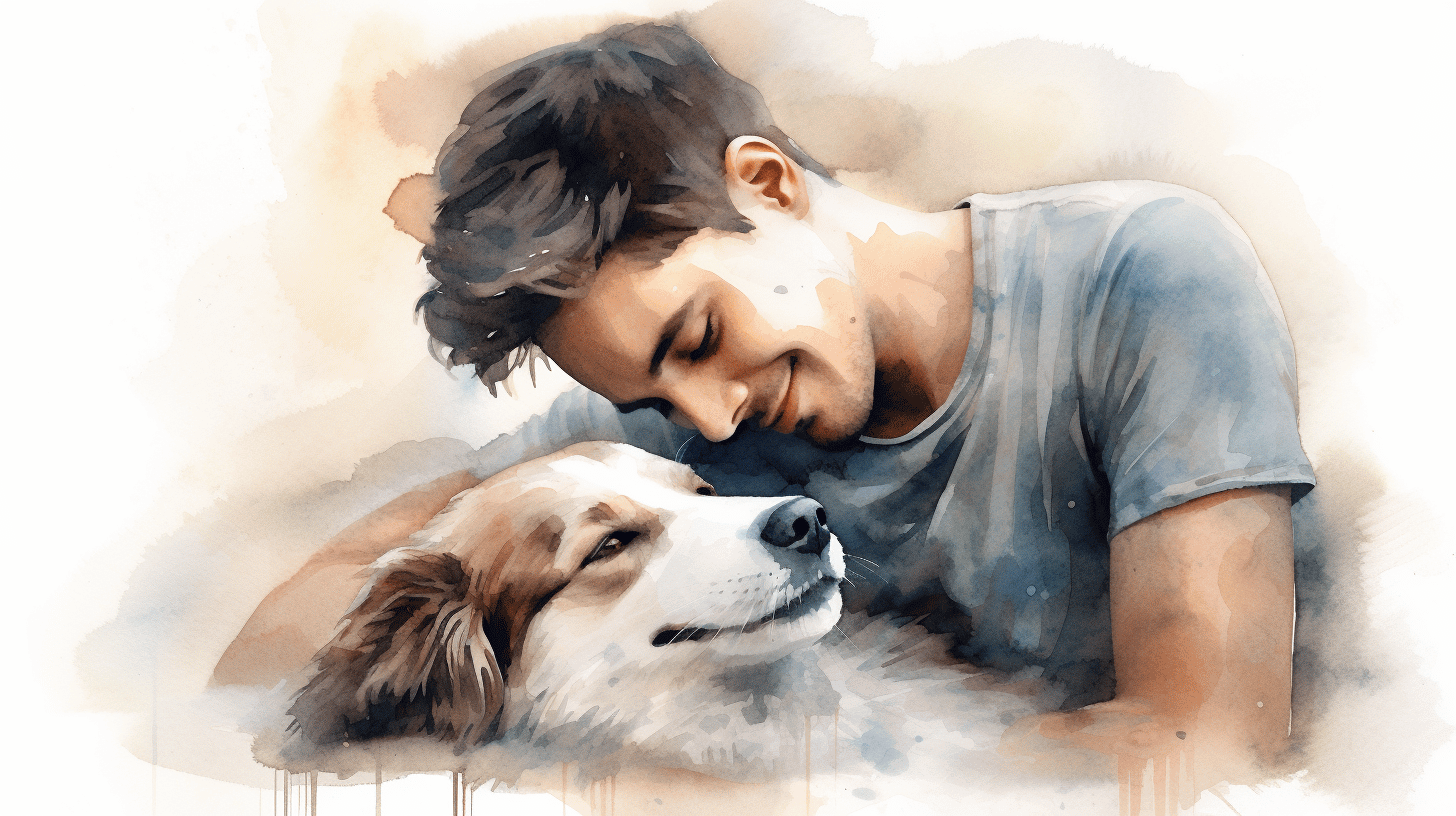If you're like us, your dog isn't just a pet; they're a part of the family. And just like any other family member, you want them to lead a happy, carefree life. However, beneath those adorable licks and excited tail wags, your pup could be battling an invisible adversary: anxiety.
Dog anxiety is a prevalent yet often overlooked problem, causing our furry friends distress and us, their caregivers, heaps of worry. But fret not. Understanding dog anxiety and learning about its effective solutions is the first step towards creating a serene environment for your much-loved pet. Join us as we delve into the world of canine anxiety, explore its triggers, signs, potential solutions, and the role of genetics. Together, let's discover how we can help our dogs lead a happier, anxiety-free life!
Understanding Dog Anxiety
For us as pet owners, it's hard to think about our furry friends experiencing anxiety. However, it's a prevalent issue that many dogs face. Anxiety in dogs can range from mild uneasiness and fear to more severe forms of stress and panic. As pet lovers, it's crucial that we understand what causes anxiety, how to spot the signs, and most importantly, how to help our pets handle it.
Prevalence of Anxiety in Dogs
We often think of dogs as carefree creatures, but numerous studies suggest otherwise. Consider this: between 20% to 50% of dogs are sensitive to noise, depending on the breed. Meanwhile, 20-25% of dogs show fearfulness of strangers, another indicator of anxiety. Fascinating, isn't it?
Even more intriguing is the fact that according to pet owners, 72.5% of dogs express anxiety-like behaviors. This striking number underscores the fact that anxiety is a significant issue that we need to understand better. With the right knowledge, we can make our pets' lives better and happier.
Side note: It's also worth bringing attention to the remarkable increase in certain types of anxiety recently. The anxiety triggered by other animals has increased significantly to 43.52% in 2022 from 16.5% in 2020.
Common Triggers of Anxiety
Let's dig deeper into what causes anxiety in our dogs. Multiple factors could trigger anxiety in animals. A couple of these common triggers include sudden loud noises – such as fireworks or thunder – and separation anxiety, which is the fear of being left alone.
In fact, separation anxiety is so prevalent that it has seen an astonishing increase of over 700% in two years. The fears and phobias our dogs face are real and affect their lives substantially. To fully grasp the depth of this subject, you might find our article on Understanding Separation Anxiety in Dogs highly helpful.
Signs of Anxiety in Dogs
Recognizing the signs of anxiety is the first step towards helping our dogs. Classic indications include behavioral changes such as barking, whining, or other vocalizations, hiding, escaping behaviors, restlessness, and excessive grooming. You may also notice physical symptoms such as excessive panting, drooling, or shaking.
Depression and anxiety are interlinking issues in dogs, with up to 40% of dogs dealing with it at some point. The main thing to keep in mind is to stay alert and observant to any changes. Every single one of our dogs is unique, and the signs of anxiety can vary significantly between them.
In wrapping up, the key takeaway we wish to drive home is the need to understand and accept that our pets face anxiety. Recognizing the prevalence, triggers, and signs paves the way for better management strategies and happier pets. There's nothing we wouldn't do for our furry friends, and that includes providing them with the safe, anxiety-free environment they deserve.
Impacts of Dog Anxiety On Owners
As ardent dog lovers, we understand how important our furry friends are to our mental health. In fact, studies have shown that dog owners have a lower depression score, on average, than non-dog owners. However, it's important to remember that this is a two-way street. Our four-legged friends can also be impacted by anxiety, which in turn affects us, their owners. One study indicated that 17.2% of dogs have separation anxiety, affecting both their quality of life and ours. How does this happen, and what can we learn from it?
Taking the word 'companion' in 'companion animals' to heart, it's not hard to see how a dog's stress can spill over and affect our mental wellbeing. Think of those moments when our dogs seem more anxious than usual – pacing, panting, and whining. As their caregivers, it's normal that our anxiety levels can skyrocket in response. Shockingly, national average anxiety rates rise from 2.9 to 3.9 when owners have an anxious dog.
But it's not all gloomy! Even though dogs can empathically absorb our anxiety and vice versa, the mutual support between humans and dogs often contributes to improving mental health. In fact, 74% of pet owners have reported an improvement in their mental health, where dogs play a significant part.
Addressing dog anxiety should be a priority. Appropriate care, training, and sometimes professional assistance can help soothe an anxious dog – and in turn, calm us, their human counterparts, as well.
Alleviating our loved one's anxiety plays a crucial role in bolstering our mental arsenal, enshrining the holistic well-being of humans and dogs alike. For more insights, check out this complete resource exploring the Link Between Pet Anxiety and Well-being. Remember, when we support our dogs, we support ourselves as well. Together, let's strive for a mentally healthier world for both us and our beloved canine companions.
Treatment and Solutions for Dog Anxiety
All dogs, much like humans, experience fear and anxiety. They can be distressed by separations, loud noises, unfamiliar environments, among many other things. This can be heart-wrenching for us pet parents because we want nothing but happiness and comfort for our furry friends. Thankfully, there's an array of solutions available to help ease canine anxiety. From pharmaceutical treatments to natural therapies, there are various options that can be tailored to suit your four-legged friend's individual needs. By leveraging our expertise, let's delve into some of these available treatments.
Pharmaceutical Treatments
Pharmaceutical treatments can provide an effective solution for managing cases of serious anxiety in dogs. Two FDA approved medications commonly used for treatment of canine separation anxiety are fluoxetine, a type of antidepressant, and clomipramine, which belongs to the class of drugs known as tricyclic antidepressants. These drugs can help to lower anxiety levels by modifying certain chemicals within your dog’s brain that convey information between the nerve cells.
However, it's important to consider that these medications only treat the symptoms, not the root cause of the anxiety. Also, pharmaceutical treatments can have side effects, and their usage needs to be monitored by a veterinarian. So, while these treatments can be highly effective, they should be used as a last resort, especially if non-drug therapies have proved ineffective.
Non-drug Therapies for Anxiety
Not all treatments for dog anxiety have to be pharmaceutical. Non-drug therapies, from exposure and behavioral therapies to physical exercise and training, are also effective in dealing with anxiety issues. These therapies aim to alleviate the root cause of anxiety rather than just alleviating the symptoms.
- Exposure Therapy: This involves the gradual exposure of your dog to stimuli that induce anxiety, with the goal of reducing fear over time. With support, reassurance, and consistency, your dog can be helped to gradually cope better with what previously caused them distress.
- Behavioral Therapy: This process involves positively reinforcing desired behaviors. This might mean rewarding your pooch when they stay calm in situations that typically scare them. Eventually, your dog will associate the previously feared situation with positive outcomes.
- Exercise and Training: Regular physical activity and training not only keep your furry friend physically fit but also mentally stimulated, improving overall behavior and reducing anxiety symptoms.
Remember that different dogs respond differently to these methods, so it's important to try a variety of approaches until you find one that works best for your pet. It's not one size fits all; it's about finding what works best for your dog.
As pet owners, we’re constantly learning more about our pets and their behaviors. We must remember the importance of patience and empathy in dealing with anxiety in our beloved furballs. If you're interested in discovering more tips and techniques, don’t hesitate to delve deeper into our Guide to Relieving Dog Anxiety for more valuable information.
Even though overcoming anxiety can be a complex journey, with love, patience, and the right treatment, we can make our beloved dogs' lives more comfortable. It’s all about understanding their needs and ensuring that they feel loved and safe — after all, that's what pet parenting is all about!
With up to 70% of behavioral issues in dogs being attributed to anxiety, it's clear that this is a matter requiring our attention. By exploring and understanding these treatment options, we can provide a happier, stress-free life for our dear canine friends.
Genetic Factors and Dog Anxiety
As affectionate pet parents, we often wonder why our beloved dogs display certain behaviors. While their lovable quirks and individualized toys are a joy to discover, understanding their fears or moments of anxiety can pose a greater challenge. Just like humans, dogs have unique genetic factors that could influence their propensity to experience anxiety. Let's delve deeper into the realm of dog anxiety and the impact genetics plays in these tendencies.
Just like us, our dogs possess a genetic makeup unique to them. These genetic codes shape not only their physical appearance but also, surprisingly, their behavior. This includes their propensity to experience anxiety.
Effect of Breed on Anxiety Levels
A defining element in a dog's genetic make-up is its breed. Far beyond influencing the dog's physical characteristics, a dog's breed can also play a significant role in its likelihood of exhibiting anxiety. Different dog breeds display varying levels of anxiety-associated traits, suggesting a strong genetic factor at play.
- Labrador Retrievers often display separation anxiety when left alone for too long.
- German Shepherds are prone to react anxiously or aggressively to strangers due to their protective instincts.
- Border Collies, known for their high energy levels, might display signs of anxiety if their active minds and bodies aren't adequately stimulated.
While these are generalized observations, they still emphasize how closely canine temperament and anxiety levels are tied to their breed and hence, their genetics. This insight is based on the observation that dog breeds show large differences in the prevalence of anxiety-related traits, which implies a robust genetic contribution.
Wrapping it all up, the interplay of genes and behavior in our canine companions is a fascinating field. It helps shed light on their unique personalities and ways to offer them comfort during times of stress. Remember, aware pet owners make the happiest pets, so let's take that extra step to understand and support our fur friends.
Conclusion
In light of what we've explored throughout this article, managing your furry friend's anxiety doesn't have to be an uphill task. With understanding and patience, and coupled with a mixture of therapies or medications as needed, you can help your canine companion feel safe and secure, even when faced with normally anxiety-inducing situations. It's our hope that this information proves beneficial in the quest to better understand and alleviate dog anxiety.
At Empowered by Ashley, we deeply care about the overall well-being of pets and their owners. We understand how crucial it is to keep our loyal companions healthy, happy, and serene. Remember, our pets are not just animals; they are members of our family who look up to us for comfort and safety.
In addition to providing solutions to help with dog anxiety, our brand also embraces products that advocate for personal safety and empowerment. That's because we believe in fostering a world where everyone, including our pets, feels safe and confident. In striving to make a meaningful difference in people's lives, we continually cherish the opportunity to serve you, helping to enhance the quality of life for you and your amazing pets.
Let's together embark on a journey of wellness, empowerment, and peace for us and our four-legged buddies. Because our families—furry members included—deserve the best.
Frequently Asked Questions
-
What are the signs of dog anxiety?
Signs of dog anxiety may include excessive barking, destructive behavior, restlessness, pacing, shaking, panting, whimpering, aggression, and inappropriate elimination.
-
What are some effective solutions for dog anxiety?
Some effective solutions for dog anxiety include creating a calm and safe environment, using anxiety wraps or shirts, providing mental and physical stimulation, practicing relaxation techniques, using pheromone diffusers, and consulting with a veterinarian for medication options.
-
How can I create a calm environment for my anxious dog?
Creating a calm environment for an anxious dog involves using noise-cancelling devices, providing a designated safe space, using soothing scents, playing calming music, using white noise machines, and keeping a consistent routine.
-
What are anxiety wraps or shirts for dogs?
Anxiety wraps or shirts are snug-fitting garments that provide gentle pressure to the dog's body, which can help alleviate anxiety. They work similarly to swaddling a baby, providing a comforting effect.
-
Are there any natural remedies for dog anxiety?
Yes, some natural remedies for dog anxiety include herbal supplements, such as chamomile or valerian root, aromatherapy using calming essential oils, and CBD oil, which can help promote relaxation.
















Leave a comment
This site is protected by hCaptcha and the hCaptcha Privacy Policy and Terms of Service apply.